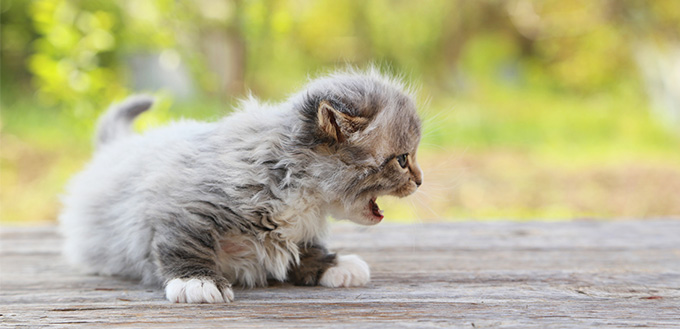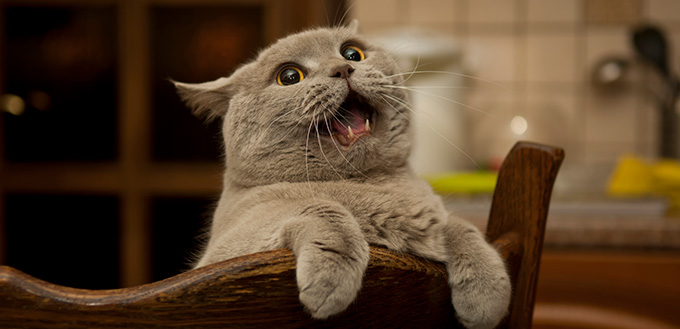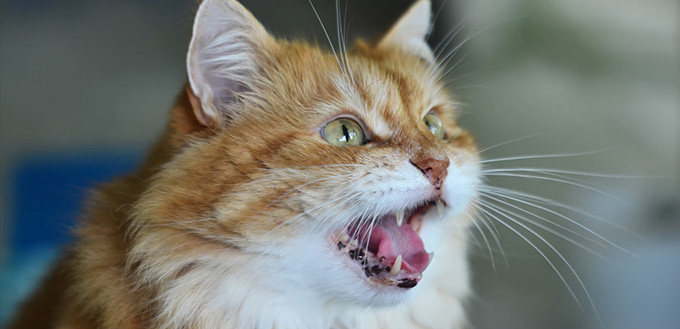Some breeds of cats are very quiet, while others like to vocalize a lot. Your cat may like to meow and purr, but you may also occasionally hear more alarming sounds, such as cat screams, yowls and caterwauling. But what is caterwauling? It sounds like such a strange, old-fashioned word, and some people don’t even realize that it means anything specific at all. However, caterwauling is an important sound for cat owners to recognize. It can help you to care for your cat and understand their needs.

Caterwauling: A Distressing Sound?
Because they cannot communicate, having a pet can be similar to having a baby. When they make a sound or exhibit unusual behavior, you have to investigate what the cause of it could be. There are several steps to this. First, you have to determine what sound it is. Is it a meow? Is it a purr? Is it a yowl? There are usually a limited number of causes once you determine which sound they are making, so you have to consider each one and investigate until you are sure you are right. This might mean offering them play-time, finding and treating a wound, offering them food, or anything else you can think of that your cat may need.
If you want to distinguish a caterwaul from a miaow, you should know that the most distinctive feature of caterwauling as a sound is the pitch. It is very high, even higher than their usual miaow, and it usually sounds very distressing. It is a drawn-out, long sound that is dramatic and may even be described as ‘melodic’. The sound is most definitely upsetting to hear, and you may even think your cat is in pain. Unfortunately, you may be right.
Why Is Your Cat Caterwauling?
If your gut reaction is that caterwauling is a negative sound, your instincts are correct. It is unlikely that your cat is experiencing a happy or pleasant emotion if they caterwaul. However, there are many reasons that your cat may be caterwauling, and not all are equally alarming. Some causes are very serious, while others require just a bit of attention and care. As caterwauling is almost always a negative response to a problem that your cat is experiencing, it can be useful to know why cats caterwaul so that you can investigate further and discover how serious the problem may be.
There are six main reasons your cat may be caterwauling, and you will need to investigate each one until you are sure that there is nothing seriously wrong with your cat. If you ignore a caterwaul, you may be ignoring a symptom of a serious illness, or leaving your cat in emotional distress. To help you, here are the top six causes of caterwauling:
1. Your Cat Wants To Mate
A cat that wants to breed often has a lot of behavior changes. They may become more aggressive, they may appear to forget their house training because they start marking their territory with urine, and they can become clingy. Similarly, they can also start caterwauling. It is particularly common for female felines who are in heat, but males that are close to a female that is in heat can also caterwaul.
Cat lovers who are trying to breed their cats may welcome caterwauling and will take it as a sign to take important next steps in the breeding program. However, most pet owners do not want unexpected kittens to take care of. Ignoring caterwauling could result in a pregnancy, so it is important that you pay attention to any caterwauling if you don’t want kittens.
The good news is that if your cat is spayed or neutered, it is unlikely that your cat is caterwauling to attract a mate. This means you can move on from this possible cause. If your cat has not been spayed or neutered, but you do not wish to breed them, you should discuss neutering or spaying your cat with your vet if you want to prevent caterwauling.
2. Your Cat Wants Attention
A common cause of caterwauling is attention-seeking. This can be a legitimate way for them to communicate with you. For example, if you are late preparing their dinner, it is one way that they will remind you to feed them. They may also caterwaul when they want water, play-time, or just some cuddles.
There is, however, a potentially negative side effect of caterwauling for attention. It is possible for cats to learn that caterwauling is the best way to get anything they want. You must make sure you are not accidentally reinforcing caterwauling as a behavior by overindulging their smallest whims. However, as caterwauling can be a symptom of something serious, it is wise to investigate all the other possibilities before your write off your cat as manipulative.
If you are certain that your cat is just trying to manipulate you into giving them more treats, you will need to stop responding to their caterwauling. You must teach them that caterwauling is not an acceptable way to get your attention. You may also want to introduce the idea that treats are given as a reward for good behavior, in order to redirect their behavior. For example, train them to respond to their name, and reward their success with treats.
Related Post: Best Cat Treats

3. Your Cat Feels Nervous
Cats can be very anxious animals. Strangers, new environments, loneliness, unfamiliar smells, new pets, and any number of things can make them become very fearful. Many cats start to caterwaul when their owners leave for work because they feel abandoned and scared. They can also whine and caterwaul after you move house, introduce a new pet to the family, or make any other changes to their life.
As a cat owner, it is important that you sufficiently prepare your cat for life changes. If you think your cat is struggling with anxiety, look out for other behavior changes, such as destroying furniture, hiding, dilated pupils, aggression and a reduced appetite. Once you know your cat is struggling with fear, you should try to spend more calming quality time with it.
Do not force your cat into doing anything it doesn’t want to, but spend time with them in a silent room together, until they come to you. Offer them treats, groom them, and generally stroke and calm them. You can also reorganize the furniture to provide more perches and escape routes, which will help them to feel secure, and you can consult your vet about plug-in hormone and smell therapies.
4. Your Cat Is Confused
Cats can also start caterwauling in old age. This is often a result of feline cognitive dysfunction (FCD), which is commonly referred to as cat dementia. It is estimated that over half of cats that are older than 11-years-old, and over 80% of cats that are older than 16, will experience disorientation as a result of FCD. If you have an old cat, it is probable that this can explain their caterwauling.
Other symptoms can include:
- Forgetting learned behaviors, such as using the litter box or where they go to sleep.
- Appearing to forget people or animals they are familiar with
- Getting lost
- Staring into space
- A reduced interest in people and family members
- Becoming clingy
- Aggression
- Changes in sleeping pattern
- A reduced appetite
- A reduced grooming routine
A cat with FCD requires even more routine and stability than the average cat. You will need to create a safe, stable environment with very regular mealtimes and bed times. Your vet may also be able to prescribe anxiety medicine.
Read here our guides on Anti Anxiety for Cats and Calming Collar for Cats.
5. Your Cat Is Warning You Of Invaders
One of the least serious causes of caterwauling is an alert designed to warn you about invaders. Most of the time, your cat is simply responding to seeing an unfamiliar animal outside, and it wants to tell you ‘watch out, someone is on our turf!’. If your cat only caterwauls when they are beside the window, it is probable that there is nothing serious that is wrong with them.
You may, however, want to train them out of caterwauling at invaders if they do it too frequently or in the middle of the night. First of all, you can remove temptation by shutting your curtains, but you can also consider redirecting their behavior when they see a foreign animal. Try to redirect them before they caterwaul, and then reward them with a treat if they succeed in not caterwauling.
Related Post: How to Catify Your Windows
6. Your Cat Is In Pain
The last but, potentially, most serious reason your cat may be caterwauling is pain. If you are truly confused about why they are caterwauling, and you think they may be distressed, pain is a likely explanation. It is worthwhile looking them over for any wounds, bumps or lesions, and heading straight to the vet if you cannot find a reasonable explanation for their outburst.

The list of potential medical explanations for vocalization is far too long to list here, but your vet will be able to narrow down the causes. Try your best to remember what exactly your cat was doing when they started caterwauling. Were they stretching a particular joint? Had they just come back inside? Had they eaten anything unusual recently? Were they rubbing a particular area against the furniture, perhaps due to an itch that is bothering them? Have they been sick recently? Once you know what is wrong, your vet will be able to offer treatment and the caterwauling should stop.
Sources:
- 8 Cat Sounds—And What They Mean, PetMD
- Lynn Buzhardt, DVM, The Cat’s Meow! Caterwauling in Cats, VCA Animal Hospital
- Why Does My Cat Meow So Much?, Best Friends Animal Society








Our elderly female cat (15 years) is an Arabian Maw we took in from the streets of Dubai. She is generally fierce (although better in her recent years) but impossible to approach from a vet point of view although at a young age we had her spayed and a tag implanted. She has started caterwauling in the last few months but I a doubtful a vet can get near her for a check up. No changes in behaviour or environment in the last 12 years since we moved back to Singapore.
Thoughts appreciated,
Jack